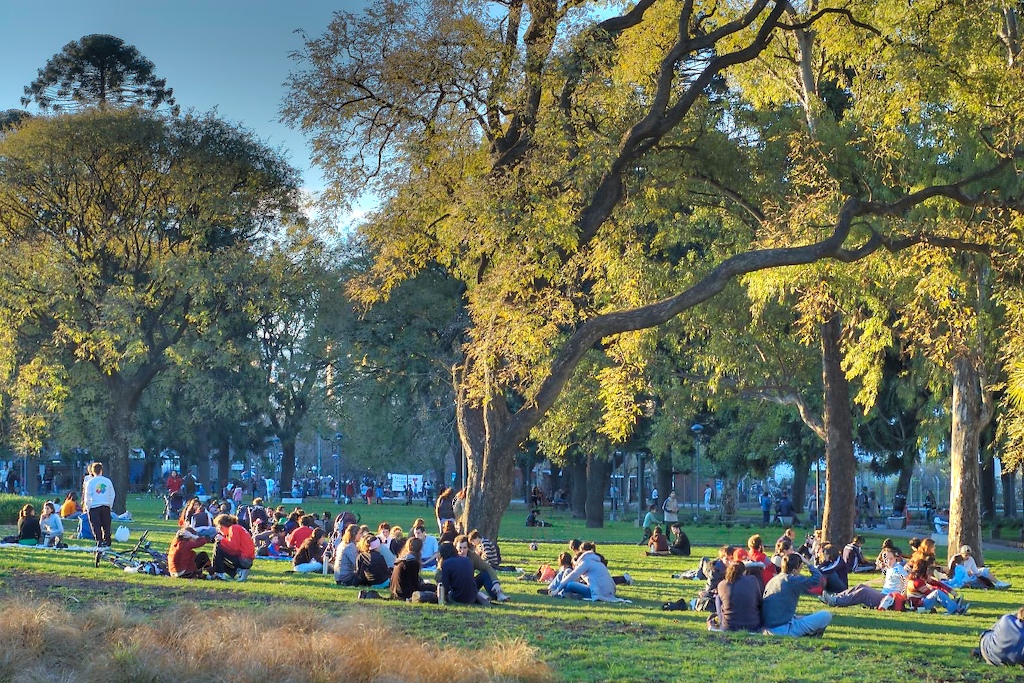Parque Centenario (Buenos Aires Metro) on:
[Wikipedia]
[Google]
[Amazon]

 Parque Centenario is an extensive public park in the
Parque Centenario is an extensive public park in the

 The outermost lots were made available to a number of cultural and scientific institutions, notably the Louis Pasteur Institute (founded in 1927), the
The outermost lots were made available to a number of cultural and scientific institutions, notably the Louis Pasteur Institute (founded in 1927), the

 Parque Centenario is an extensive public park in the
Parque Centenario is an extensive public park in the Caballito
Caballito (; Spanish for "little horse") is a '' barrio'' (neighborhood) of the Argentine capital, Buenos Aires. It is the only ''barrio'' in the administrative division ''Comuna'' 6.
It is located in the geographical centre of the city, limite ...
district of Buenos Aires
Buenos Aires ( or ; ), officially the Autonomous City of Buenos Aires ( es, link=no, Ciudad Autónoma de Buenos Aires), is the capital and primate city of Argentina. The city is located on the western shore of the Río de la Plata, on South ...
, Argentina
Argentina (), officially the Argentine Republic ( es, link=no, República Argentina), is a country in the southern half of South America. Argentina covers an area of , making it the second-largest country in South America after Brazil, th ...
.
Overview
Presiding over a rapidly expanding city, the Buenos Aires City Council in 1908 approved the purchase of a 10 hectare (25 acre) plot belonging to Parmenio Piñero, a local brickmaker, for the purpose of a creating a "Westside Park" (the area was near Buenos Aires' western limits at the time). The project was entrusted to the City Parks Administrator, the renowned French Argentine urbanistCharles Thays
Carlos Thays (August 20, 1849 – January 31, 1934)Biog ...
, who completed the project in time for the 1910 centennial of the May Revolution
The May Revolution ( es, Revolución de Mayo) was a week-long series of events that took place from May 18 to 25, 1810, in Buenos Aires, capital of the Viceroyalty of the Río de la Plata. This Spanish colony included roughly the terri ...
(hence the park's name, ''Centenario''). Rerouting two streets, Thays created a circular green space anchored by fountain in the middle. The outer sections of the park were planned for residential development, though these plans were later rescinded.
Marie Curie
Marie Salomea Skłodowska–Curie ( , , ; born Maria Salomea Skłodowska, ; 7 November 1867 – 4 July 1934) was a Polish and naturalized-French physicist and chemist who conducted pioneering research on radioactivity. She was the first ...
Oncological Institute (1931), the Bernardino Rivadavia Natural Sciences Museum
The Bernardino Rivadavia Natural Sciences Argentine Museum ( es, Museo Argentino de Ciencias Naturales Bernardino Rivadavia) is a public museum located in the Caballito section of Buenos Aires, Argentina.
History and overview
The museum owes it ...
, which relocated there from its original building in 1937, and the Argentine Friends of Astronomy Association, who opened their observatory at the park in 1944; the Leloir Institute
The Leloir Institute is a non-profit research center in Buenos Aires specializing in biochemistry, cellular biology, molecular biology, and related activities.
Overview
The research center was inaugurated in 1947 by way of an initiative of Unive ...
- one of the nation's leading biotechnology
Biotechnology is the integration of natural sciences and engineering sciences in order to achieve the application of organisms, cells, parts thereof and molecular analogues for products and services. The term ''biotechnology'' was first used ...
research centers - and the Central Naval Hospital were both opened during the early 1980s in lots facing the park. President Juan Perón had the central fountain replaced in 1951 by an amphitheatre
An amphitheatre (British English) or amphitheater (American English; both ) is an open-air venue used for entertainment, performances, and sports. The term derives from the ancient Greek ('), from ('), meaning "on both sides" or "around" and ...
with a capacity for 20,000 spectators, a structure lost to arson in 1959. Mayor Osvaldo Cacciatore
Osvaldo Cacciatore (1924–2007) was an Argentine Air Force brigadier and Mayor of Buenos Aires during the National Reorganization Process military dictatorship.
His management at the head of the city of Buenos Aires was controversial for the w ...
had a shallow lake built over 2000 m2 (21,000 ft²) of the central section of the park during the late 1970s, later populated with duck
Duck is the common name for numerous species of waterfowl in the family Anatidae. Ducks are generally smaller and shorter-necked than swans and geese, which are members of the same family. Divided among several subfamilies, they are a form ...
s, swans and other waterfowl. The mile-long perimeter became a popular joggers' route and a number of important public institutions had been opened along the park's surroundings.
Parque Centenario increasingly suffered from neglect during the 1980s, a trend underscored by the 1989 theft of the iconic bronze female nude in sculptor Luis Perlotti's ''Fountain of the Irupé Flower''. Mayor Aníbal Ibarra initiated an ambitious restoration project for the park in 2005, resulting in the reconstruction of the amphitheatre, the refurbishment of the swan lake and the creation of a number of new facilities. The park's refurbishment was concluded in May 2009, and the new, 2,000 seat amphitheatre was inaugurated with a performance by the City Tango Orchestra. Mayor Mauricio Macri
Mauricio Macri (; born 8 February 1959) is an Argentine businessman and politician who served as the President of Argentina from 2015 to 2019. He has been the leader of the Republican Proposal (PRO) party since its founding in 2005. He previo ...
's decision to install a perimeter fence around the park in 2013, however, resulted in a violent protest by opponents of the plan.
References
{{DEFAULTSORT:Parque Centenario Centenario Urban public parks